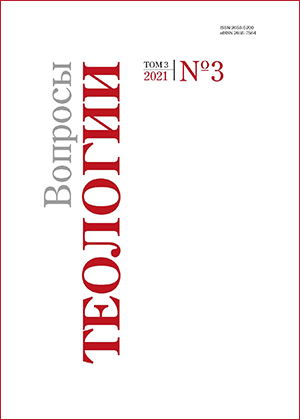The unity of the divine and the human in Christ: The Chalcedonian definition and Paul Tillich’s Spirit Christology
DOI:
https://doi.org/10.21638/spbu28.2021.307Abstract
The Christological disputes of the 6th–7th centuries (the polemics of Leontius of Byzantium with the Nestorians and Eutychians, and Maximus the Confessor with the monoenergistes/monothelites) showed that the Chalcedonian definition gives rise to a number of problems that cannot be solved within the framework of traditional theology: the unclear ontological status of human nature without a human hypostasis; the inconsistency of the ontological models underlying trinitology and Christology; the need to resort to an artificial interpretation of the gospel testimonies about Christ. However, the Chalcedonian definition is only one possible way to describe the unity of the divine and the human in Christ. The Christology of Paul Tillich is considered as an example of an alternative description in which the above problems do not arise. Tillich’s idea is to replace the traditional concept of the Logos incarnated in man with the concept of the Spirit of God transforming man. According to this view, God does not act on human nature without hypostasis, but on the hypostasis of man through its unifying center. During the earthly life of Christ, this effect occurred only in the hypostasis of Christ as man. And after (and thanks to) the death on the cross and the resurrection of Christ, it extends to all people.
Keywords:
Christology, Chalcedonian definition, human nature, ontological interpretation, unifying center of hypostasis, Gospel testimony, Spirit Christology
Downloads
References
Benevich G. I., Shufrin A. M. (2007) “Delo Maksima”, in Benevich G. I., Biryukov S., Shufrin A. M. (eds) Maksim Ispovednik. Polemika s origenizmom i monoenergizmom, pp. 13–79. St. Petersburg, St. Petersburg University Press. (In Russian)
Chernyavsky A. (2020) The crisis of traditional theology and the search for a way out. Moscow; St. Petersburg, Tsentr gumanitarnykh initsiativ Publ. (In Russian)
Dionisius (Shlyonov), hieromonk (2004) “Gethsemane prayer in the light of the Christology of St. Maximus the Confessor”, in Disput s Pirrom. Prp. Maksim Ispovednik i khristologicheskie spory VII stoletiia, pp. 339–378. Moscow, Khram Sofii Premudrosti Bozhiei v Srednikh Sadovnikakh Publ. (In Russian)
Florovsky G. V. (1992) Eastern Fathers of the 5th–8th centuries. Moscow, Palomnik Publ. (In Russian)
Habets M. (2003) “Spirit Christology: Seeing in Stereo”, in Journal of Pentecostal Theology, vol. 11, no. 2, pp. 199–234.
Krausmüller D. (2011) “Making Sense of the Formula of Chalcedon: the Cappadocians and Aristotle in Leontius of Byzantium’s ‘Contra Nestorianos et Eutychianos’”, in Vigiliae Christianae, vol. 65, no. 5, pp. 484–513.
Krausmüller D. (2020) “Making Sense of the Formula of Chalcedon: the Cappadocians and Aristotle in Leontius of Byzantium’s ‘Contra Nestorianos et Eutychianos’”. Transl. by A. Chernyavsky, in Bogoslov.ru. December 21. Rus. ed. Available at: https://bogoslov.ru/article/6169306 (accessed: 26.08.2021). (In Russian)
Loofs F. (1888) “Leontius von Byzanz und die gleichnamigen Schriftsteller der griechischen Kirche”, in Texte und Untersuchungen zur Geschichte der altchristlichen Literatur, Bd. 3 (1), S. 1–317.
Macquarrie J. (1974) “Some Problems of Modern Christology”, in Indian Journal of Theology, vol. 23, no. 3–4, pp. 155–175.
Mcrtchyan R. A. (2013) “Concepts of general and particular natures in chalcedonite and pre-chalcedonite Christology”, in Tserkov’ i vremia, no. 2, pp. 29–62. (In Russian)
Seleznyov N. N. (2005) Nestorius and the Church of the East. Moscow, Put’ Publ. (In Russian)
Tillich P. (1976) Systematic Theology. In 3 vols. Russ. ed. Moscow; St. Petersburg, Tsentr gumanitarnykh initsiativ Publ. (In Russian)
Downloads
Published
Issue
Section
License
Articles of "Issues of Theology" are open access distributed under the terms of the License Agreement with Saint Petersburg State University, which permits to the authors unrestricted distribution and self-archiving free of charge.




